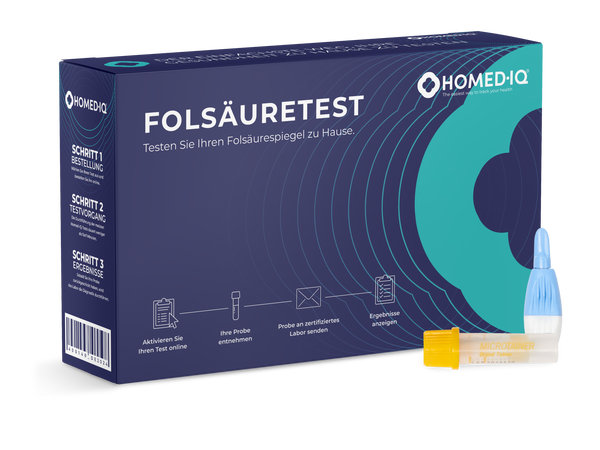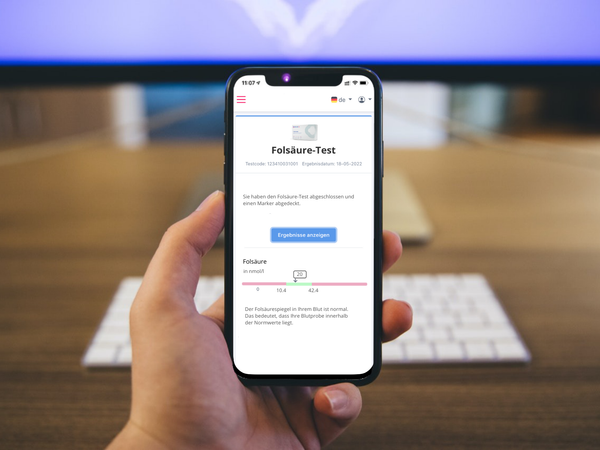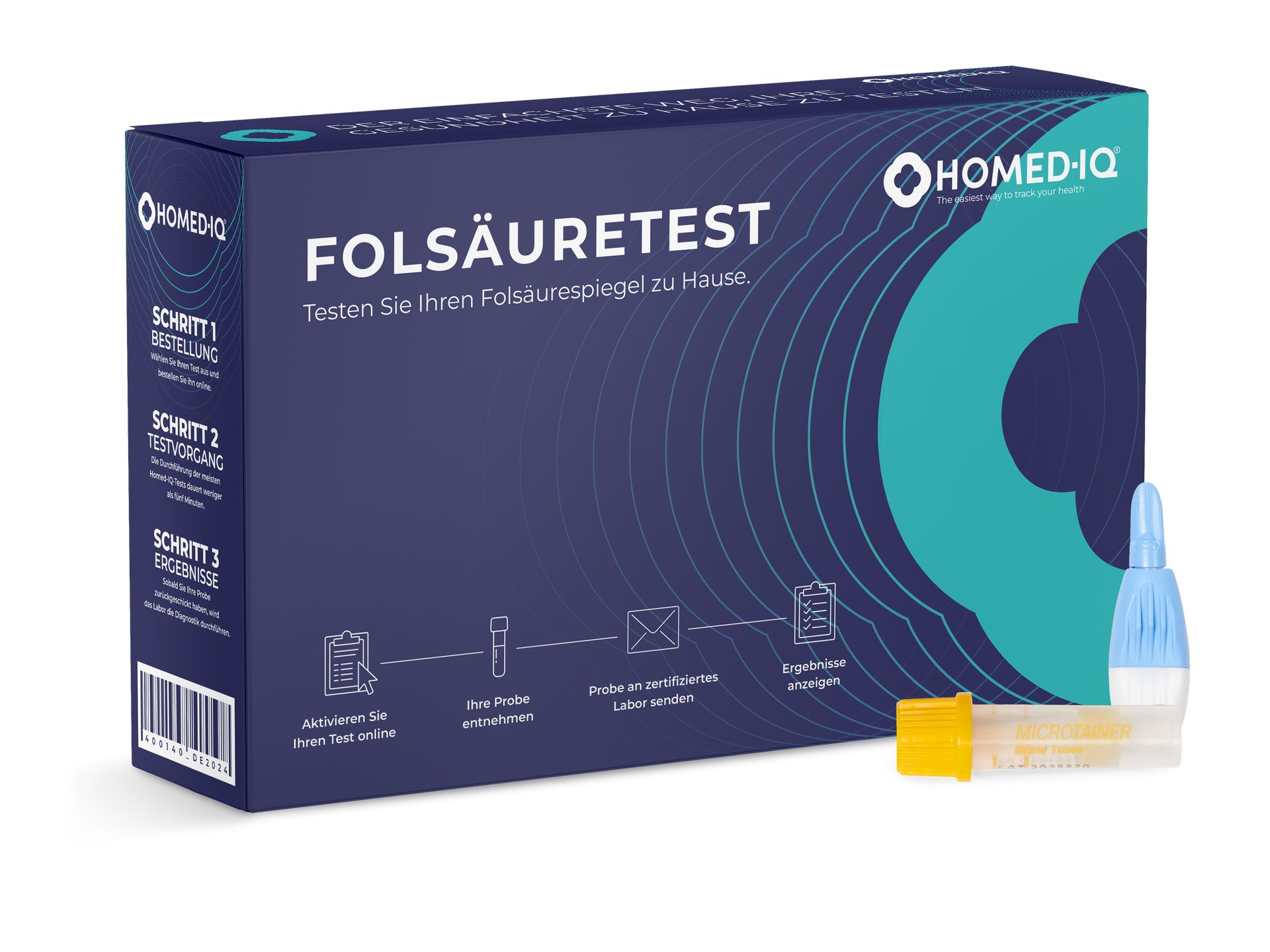Folic Acid Test
FREE SHIPPING TO
Folic acid, also known as vitamin B9, is a water-soluble B-vitamin that plays a fundamental role in many essential bodily functions. Folic acid is crucial for DNA synthesis, cell division, and the production of red blood cells. Folic acid is especially vital during periods of rapid growth and development, such as pregnancy. Adequate intake of folic acid is essential for maintaining overall health and preventing certain birth defects. This home blood test checks the level of folic acid in your blood.
Test mode:
Finger prick test
How does Homed-IQ’s Folic Acid Test work?
This test measures the concentration of folic acid in the blood. After collecting a small blood sample via a finger prick, send your sample to one of Homed-IQ’s partner laboratories for analysis. Your test results will be sent to your online account within a few days, complete with a laboratory report that can be brought to your GP for followup.
How do I collect my sample for the Folic Acid Test?
This is a finger prick blood test. Your test kit contains all the necessary materials to collect your sample. If you would like to see a step-by-step demonstration of how to take a blood sample using a Homed-IQ test, watch our instructional video.
What’s in the test kit?
This test kit contains instructions for use, lancets for collecting a few drops of blood, a blood collection tube, alcohol wipes, band-aids, a protective transport bag and a return box to send your sample to our certified laboratory.
What is the Homed-IQ testing process like?
Homed-IQ’s vitamin tests come with everything you need to successfully take a blood sample at home. Simply activate your test and follow the provided instructions to successfully collect the sample and then send it to our certified laboratory using the prepaid shipping label. The results will be available within a few days.
How soon will I receive the results of this at-home vitamin test?
Once you have taken your blood sample and sent it to our medical partner laboratory, it should take a few working days to receive your test result. As soon as your test kit arrives at the laboratory you will receive a notification by email. Once your test result is ready, you will receive a text message and an email with a link to your result. Homed-IQ aims to keep you well informed throughout the testing process and provide a seamless testing experience.
What do the results of this test mean?
Folic acid deficiency
A folic acid level below 10.4 nmol/L indicates a folic deficiency. This can be caused by different factors. If your folic is low, see your GP. They may recommend supplements or test other vitamin levels, such as vitamin B12.
To boost your folic acid levels through diet, eat more foods that contain it. These foods include:
- Dark leafy greens
- Peanuts
- Beans
- Whole grains
- Sunflower seeds
Sufficient folic acid
A folic acid level above 10.4 nmol/L and below 42.4 nmol/L is sufficient.
Elevated folic acid
A folic acid level above 42.4 nmol/L is elevated. Elevated folic acid is uncommon as excess B12 is usually removed from the body in urine. Elevated vitamin B12 could be due to:
- Pernicious anemia
- Blind loop syndrome
- Excessive supplement use
If your folic acid level is elevated, see your doctor for further advice.
Folic Acid
Folic acid is a vitamin that your body cannot make on its own. While most people obtain enough folic acid by eating a varied diet, folic acid deficiency is one of the most common vitamin deficiencies in developed countries. Folic acid is mainly found in green vegetables, fruits and whole grains, but also in milk products. Common symptoms of folic acid deficiency are a loss of appetite, weight loss and/or fatigue. Pregnant women who are deficient in folic acid during early pregnancy are also at a higher risk of having a baby with neural tube defects. Adults need 300 micrograms of folic acid per day. Regardless of diet, pregnant women are advised to take at least 400 micrograms every day in the form of supplements.
Symptoms
Folic acid deficiency can lead to a condition known as folate deficiency anemia, which is characterized by a reduction in red blood cell production and enlarged red blood cells that do not function properly. Folic acid deficiency can cause a range of symptoms that may get worse over time, and are often similar to iron-deficiency anemia. Symptoms may include:
- Fatigue and shortness of breath: Insufficient red blood cells may lead to reduced oxygen delivery to body tissues, resulting in fatigue, shortness of breath, and weakness. Fatigue is one of the most common symptoms of folate deficiency anemia.
- Pale skin: Folate deficiency anemia can result in a lack of hemoglobin and oxygen delivered to the body’s tissues, causing pale skin.
- Tongue and mouth changes: Folic acid deficiency can cause the tongue to become swollen, sore, red, or develop small ulcers. The inside of the mouth may also be affected.
- Digestive problems: Some people may experience nausea, diarrhea, or appetite loss as a result of folic acid deficiency.
- Irritability and mood changes: Folate plays a role in neurotransmitter synthesis, and a deficiency may contribute to irritability, forgetfulness, and mood changes.
- Cognitive issues: In severe cases, folic acid deficiency may lead to cognitive impairment, difficulty concentrating, and impaired memory.
- Neural tube defects in children: Folic acid deficiency during pregnancy increases the risk of having a baby with neural tube defects, which affect the brain, spine, and spinal cord. Most neural tube defects can be prevented with sufficient folic acid intake during early pregnancy.
How does it work?
Order your test
Fast and discrete letterbox delivery
Activate & take your sample
Video instructions included
Laboratory analysis
ISO - Certified lab network
Receive your results
Easy access through mobile








